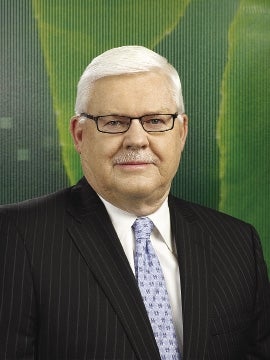In the 18 years since Waters Corp. went public, other life sciences companies have expanded their product lines, made opportunistic acquisitions, merged and spun off new entities.
But the Milford-based laboratory sciences company has stood pat. Where competitors’ offerings cover a wide range of fields within lab sciences and beyond, Waters focuses on two methods of analyzing laboratory samples. That’s all it does. And it has paid off, with revenues rising 500 percent over two decades.
When the company’s CEO, Douglas Berthiaume, announced he will retire within the next 24 months, it raised more questions than a typical leader’s decision to leave otherwise would. Berthiaume has led Waters since before its IPO, and most of the company’s other senior leaders also have some serious longevity with the firm. The situation has observers wondering if the company will change direction or stay on a path that has served it well so far.
The ‘Next Chapter’ For Waters
“It’s kind of the next chapter in Waters,” said Tony Butler, an analyst with Barclays Capital. “It’s part two.”
Waters focuses on specific kinds of technology known as liquid chromatography and mass spectrometry, lab techniques used in everything from pharmaceutical research and development to quality control for soda makers.
“If you believe in fresh water and food and health care, you have to use these instruments,” Butler said. “And so, as the world increasingly becomes more industrialized, these instruments get sold not only in the United States … they get used everywhere.”
In 2012, the U.S. accounted for 29 percent of Waters’ total $1.8 billion in sales, while Europe made up 30 percent and Asia 34 percent. Sales in China alone jumped 21 percent from 2011 to 2012, even as the company’s overall numbers took a slight dip.
Waters spokesman Jeff Tarmy said the pharmaceutical industry represents about 60 percent of the company’s business, but it also sells plenty to labs that focus on food, chemicals, polymers and clinical and forensic testing. And there’s no reason to think the market won’t keep growing.
“Especially in these developing nations, there’s an understanding of the need for greater presence of laboratories within their infrastructures,” Tarmy said.
Waters competes against much larger life sciences companies like Thermo Fisher, as well as peers closer to its size. Tarmy said its game plan is all about specialization. It goes up against most of those other companies only within a small fraction of their offerings, he said.
“Our strategy is to stay focused in these areas that we know best,” he said. “We believe (in) staying as an independent, focused, first-to-market (company).”
Butler said Waters’ level of focus is unusual. While the company has made some small acquisitions, in areas like software that’s relevant to its offerings, he said the company has used much of its free cash to buy back shares of stock, driving up value for shareholders.
That has led to “an extraordinarily healthy business,” Butler said, but it’s an unusually conservative approach. “It takes a tremendous amount of discipline, believe it or not, to not do that,” he said.
Analyst: Expansion Depends On Next CEO
Jeff Elliott, an analyst with Robert W. Baird & Co., said whether the company’s focus expands could depend on who the next CEO is. If Waters were to decide to pursue a candidate from outside, Elliot said, it would be an appealing job for many highly qualified executives in the industry. “There are, I would assume, a lot of people who would be eager to join Waters in this role,” he said. “I think they’ll have a lot to pick from.”
To Butler, there are clear challenges that would come with either an internal or external candidate. The company’s senior management team has been on board for years. Of the five top leaders, none are younger than 55 years old or have less than 10 years’ tenure at Waters.
That tight-knit environment could create a challenge for an external candidate, Butler said, but at the same time it reflects a lack of senior executives who are at the right point in their careers to start a new chapter for the company.
“It would require a very special individual from the outside to come in, and I just wouldn’t think that would be an easy solution,” he said. “I don’t know who would be internally. It’s just not obvious. There may be a mid-level person, but they certainly haven’t been a senior-level manager.”
Waters has said it’s looking at both internal and external candidates, but Tarmy said it’s not seeking someone who would radically change the company.
“There is no anticipation of change in strategy from our focused chromatography-spectrometry, strategy,” he said. “We don’t anticipate any different requirements from a CEO to take us in a new direction.”
Tarmy said the longevity of the senior executives will help in the transition to a new CEO. But Butler said he wonders whether Berthiaume’s departure will herald a longer-term transition in which other senior executives and board members turn over as well.
“There are a lot of changes that could occur,” he said. “I don’t think it’s one man, or one woman, that comes and sits in that seat and it’s just business as usual.”
Buyout Target?
In fact, there has been a bit of chatter in recent months suggesting Waters could be an acquisition target. Goldman Sachs analyst Isaac Ro wrote in June that its strategic value makes it potentially attractive to larger life sciences companies.
Elliott said the life sciences industry has experienced a great deal of consolidation, making a sale of Waters at least a slim possibility.
“In light of the management transition, nothing would surprise me at this point,” he said.
But, Elliott added, whatever the future holds, Waters’ good balance sheet and strong product portfolio mean it’s in a good position to figure out its best options.
“They’re acting from a position of strength,” he said.
Read more
Waters Announces CEO’s Retirement

